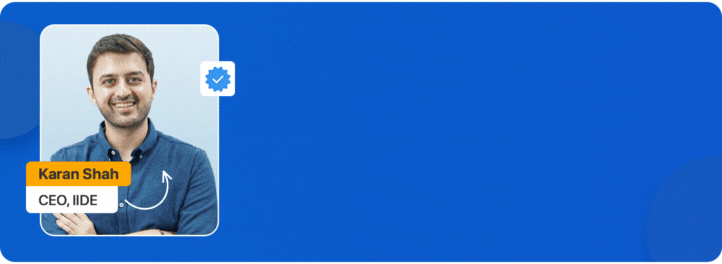Social media plays a huge role today in our lives. With Facebook being the 3rd most popular website in the world, after Google and Youtube. With so many social platforms and billions of users, there is a need for order and that is where social media algorithms come in.
In this guide to social media algorithms, you will get a better understanding of what social media algorithms mean for you, how social media algorithms work, and some top tips and strategies.
An algorithm is a basic set of rules or a process that needs to be followed that defines how a certain calculation needs to be made for problem-solving. In terms of social media, algorithms help to maintain a dort of order and help in search result rankings and ads.
For example, a platform like Facebook has a certain algorithm put in place for pages and content to be displayed in a certain manner.
With 4.55 billion social media users today, algorithms are a way of monitoring and managing content and social media accounts. There is no clear guidebook as to how to manage and maintain social media algorithms, there is enough knowledge out there to understand how to work around the social media landscape and come out successful.
A user-friendly approach is something most platforms are looking into such as Google which is one of the greatest examples in the history of social media algorithms. This enables users to have a good experience with high-quality content and engagement with customers.
Since social media algorithms are constantly changing and are dynamic in nature, it is important for digital marketers to understand them well enough.
Check out this online course on social media marketing for more.
There are quite a few reasons why social media algorithms are so important for digital marketers today. Some of these reasons include –
- Targeted Social Media Ads
The best part of social media algorithms is that social media ads are much more targeted. You could be getting ads from your favorite store so you scroll through the products. The next time, you see an ad for the product you were interested in.
An algorithm monitors and records your interests by seeing how long you hovered over a particular product, if you clicked on it, etc. This is good for marketers as ads are very targeted and also for consumers as relevant ads pop up instead of irrelevant ones that can frustrate a user.
- Relevant content
Algorithms match the best content to your likes and interests. Whether it is articles, blogs, or posts, it is helpful in matching the right content to a user. This means a user would spend more time on things that they are actually interested in and keen for.
- Increased engagement
Engagement is a metric that includes likes, comments, saves, and shares and is a really important metric on social media. It helps a brand connect to its audience through emotional appeal – a positive feeling towards your brand in order to engage with it.
- Mindful Promotions
The attention span of a user has reduced and their frustration on being spammed with constant ads has drastically increased. Hence, being mindful of promotions and showcasing the right ads to the right audience is very important for digital marketers today and this is where algorithms come into play.
- Monitor Performance
Algorithms analyze data to provide social media users with the right content. They provide you with valuable insights that can help you track the performance of your content and understand what is the best strategy that works for your followers.
So, how does it exactly work?
Wondering how do social media algorithms work exactly? They work by customizing each unique user’s feed on the basis of his or her past actions on that particular platform. For example, most social media feeds do not show all the updates and friends’ posts – they are organized and show up in a manner that is based on past interest in that friend or family member.
This is done through a process and information gathered through various metrics based on a user’s browsing history, likes, comments, and shares history to understand what the user would be interested in the most.
They use the algorithms to focus on the kind of content the user has previously shown interest in. With the introduction of social media algorithms, social media platforms can now demand marketers to pay for the best ad slots. This is a great way of separating your message from the clutter to get noticed.
This is exactly how social media algorithms work today.
-
Facebook Algorithms

The Facebook algorithm is focused on increasing audience engagement. It is designed to appeal to the emotional aspect of its users overtaking on an emotional approach. It relies on family-driven content. It works in a manner that users are displayed with posts related to their family and friends and promotional ads are not a hard-sell.
Paid ads have more visibility than organic ads and these also depend on user response. Facebook tends to avoid spamming its users with irrelevant ads.
-
Instagram Algorithms

Instagram’s algorithm, powered by Facebook uses the latest AI technology which is a little more complex and holistic in nature. It takes into consideration much more than relevancy and engagement – user preferences and patterns as well.
The algorithm picks up on your previous, likes, comments, shares, and saves and accordingly displays certain accounts’ posts. It also segregates the accounts that you least interacted with, most shown in your feed, and suggests similar accounts that you might be interested in. This also gives the account higher rankings as it is displayed to relevant users.
-
Twitter Algorithms

Publishing time and relevant content are some of the ranking factors that Twitter’s algorithm follows. There are content preference settings that allow the platform to gauge exactly what a particular user is looking for.
If a user wishes to see the latest posts, they can accordingly change their preference settings. If this setting is not opted for by the user, then the Twitter algorithm picks up on the most relevant posts like Facebook and Twitter.
-
LinkedIn Algorithms

LinkedIn is a one-of-a-kind professional networking platform. It is more focused on quality networking over the quantum of followers one has. It has placed professionals at the right places and helped businesses grow all over the world by putting industry experts in touch and enabling companies to find the right talent.
The algorithm focuses on building new, meaningful professional connections. If someone on your list has liked a post, you can still see that post as it may interest you. The algorithm also is for engagement.
-
Pinterest Algorithms

Pinterest is a unique visual, image-only search engine. It uses a traditional ranking algorithm based on your previous browsing history on the platform and suggests similar accounts to your feed.
-
Youtube Algorithms

Youtube is a video-only platform and works as a search engine. The algorithm works in a way that it picks up a user’s interest and displays them with suggestions based on this. It gives you continuous suggestions and quickly so that the user does not lose interest.
Top Tips & Strategies to Win Social Media Algorithms
Whilst there are social media algorithms politics and lots of bias in social media algorithms, the key is to understand how to win these algorithms. Here are a few ways that you can win social media algorithms –
1. Create high-quality content
The algorithm has certain equations that identify whether a certain post or piece of content is high-quality or low-quality. Hence, your content needs to be of high quality with good formatting, relevant content, keywords, and good quality visuals.
2. Understand your target audience
Really get to know your target audience. Even though your target audience might be the same on all platforms, their behavior can be different from platform to platform. Some users might prefer Instagram over Facebook for example and might spend more time on it. Hence, tailor your content and focus on platforms that your target audience interacts with the most.
3. Get your audience to engage
Your content needs to be so good that users should want to like, comment, and share it. This also builds credibility for your brand.
4. Post at the right time
Check when your target audience is the most active on social media through insights. This will give you a fair idea of when to post. If your audience is the least active at 9 p.m. for example, there is no point in posting then.
5. Post regularly
Consistency is key. Keep posting regularly so that you build a following but do not spam your followers. This can backfire by them unfollowing you. Post when they are most active.
Using hashtags will help you get noticed. Your hashtags need to be relevant. Use the hashtags which are most searched as well as related hashtags.
7. Stay up-to-date with all features
Since social media algorithms are dynamic and keep changing, it is very important to keep track of any new features or changes in the existing algorithms for all the platforms.
8. Use personal contacts
For social media algorithms such as LinkedIn, your personal connections are much more important as they run the platform. This goes the same for Instagram and Facebook. It is more likely that a family member or friend will like your post as opposed to a celebrity or an opinion leader that you’ve never interacted with earlier.
9. Include Good Visuals
For Pinterest and Youtube algorithms, your visuals need to be appealing, clutter-free, and relevant. Your preview photos also need to be related to the topic since these are visual search engines.
FAQs
Q. Are there any negative effects of social media algorithms?
Just like anything else, there are pros and cons of social media algorithms. Addiction to social media, anxiety, comparison, and unrealistic aspirations are a few of the negative effects of social media algorithms. The problem with social media algorithms can be resolved by reducing time on social media and having realistic aspirations by the user and social media algorithm ethics followed by all platforms.
Q. How do you beat social media algorithms?
Here’s are a few ways to beat social media algorithms –
- Post at the right time
- Upload videos
- Experiment with hashtags
- Create relatable content that users would want to share
- Tag your location
- Use the chatbots in messenger to keep the engagement with users high
Q. Are social media algorithms AI?
Yes, social media algorithms are powered by artificial intelligence (AI). An AI algorithm regulates what content is placed in front of interested users.
Q. How can I improve my social media algorithm?
Here are a few tips on how to improve your social media algorithm –
- Choose the right platforms to market your brand
- Target the correct audience
- Post quality content
- Make use of user-generated content
- Post at the right timings
Conclusion
We really hope you enjoyed reading this article on social media algorithms and how they work. If this digital marketing world is something that interests you and you wish to pursue a career in it, we recommend upskilling by taking up courses that add value to your resume.
A few such courses are the MBA Level Post Graduation Program in Digital Marketing (a full-time course) and this online comprehensive digital marketing course for fast-track learning.
If you’d like to know more, get in touch with our experts at IIDE!





![50+ Google Ranking Factors Every Digital Marketer Should Know in [year]](https://iide.co/wp-content/w3-webp/uploads/2021/09/Google-Ranking-Factors-Featured-Image-400x250.pngw3.webp)
![Top 9 Digital Marketing Agencies in Dubai To Hire in [year]](https://iide.co/wp-content/w3-webp/uploads/2022/01/digital-marketing-agencies-in-dubai-featured-image-396x250.pngw3.webp)
0 Comments